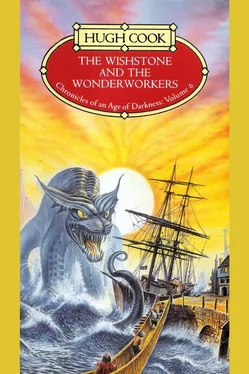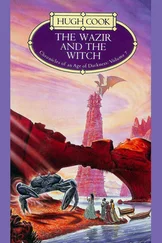Hugh Cook - The Wishstone and the Wonderworkers
Здесь есть возможность читать онлайн «Hugh Cook - The Wishstone and the Wonderworkers» весь текст электронной книги совершенно бесплатно (целиком полную версию без сокращений). В некоторых случаях можно слушать аудио, скачать через торрент в формате fb2 и присутствует краткое содержание. Жанр: Фэнтези, на английском языке. Описание произведения, (предисловие) а так же отзывы посетителей доступны на портале библиотеки ЛибКат.
- Название:The Wishstone and the Wonderworkers
- Автор:
- Жанр:
- Год:неизвестен
- ISBN:нет данных
- Рейтинг книги:4 / 5. Голосов: 1
-
Избранное:Добавить в избранное
- Отзывы:
-
Ваша оценка:
- 80
- 1
- 2
- 3
- 4
- 5
The Wishstone and the Wonderworkers: краткое содержание, описание и аннотация
Предлагаем к чтению аннотацию, описание, краткое содержание или предисловие (зависит от того, что написал сам автор книги «The Wishstone and the Wonderworkers»). Если вы не нашли необходимую информацию о книге — напишите в комментариях, мы постараемся отыскать её.
The Wishstone and the Wonderworkers — читать онлайн бесплатно полную книгу (весь текст) целиком
Ниже представлен текст книги, разбитый по страницам. Система сохранения места последней прочитанной страницы, позволяет с удобством читать онлайн бесплатно книгу «The Wishstone and the Wonderworkers», без необходимости каждый раз заново искать на чём Вы остановились. Поставьте закладку, и сможете в любой момент перейти на страницу, на которой закончили чтение.
Интервал:
Закладка:
Pokrov was dismayed by this languid response. He had hoped to stir up some passion in his pupils, which was why he had deliberately insulted them by turning their attention to such kindergarten stuff. But obviously the Ebrell Islander at least was incapable of intellectual arousal, or at any rate not today.
In truth, Chegory couldn’t care less whether they studied the most basic of basics or the Higher Arcana. He disliked the study of the inhumanities entirely. Even the presence of Olivia Qasaba failed to add enjoyment to the study session. He almost wished he was with Ox Zan, enduring the tender mercies of Doctor Death.
On and on went the lessons, until at last they took a break for afternoon tea, for which Artemis Ingalawa joined them. Afternoon tea! Ah yes! One of the greatest achievements of the Izdimir Empire is to have universalised this custom. How pleasant it is to sit outdoors drinking green tea and making educated guesses as to the provenance of the same while watching the clouds form and reform.
Only on Jod in the season of Fistavlir there were no clouds. There was only the aching blue sky. And the stench of dikle and shlug outpouring from the wealth fountains. And there was no mystery in the provenance of the tea. It came of course from Chay, that harbourless highrise island which lies southeast of Untunchilamon, mid-ocean between Injiltaprajura and the shores of Yestron.
Chay, of course, is the leading source of tea, coffee and spices of all descriptions for the area [Here an extensive geography lesson has been excised. By Order, Eder Digest, Redactor Minor. There is nothing more tedious than the Originator of this Text when said Originator yields to the didactic impulse.]
There thus they sat, drinking tea, looking for all the world as if they were aristocrats in Ang. While they were thus amusing themselves, a small sun-bright sphere came bouncing through the air.
‘Shabble!’ said Ivan Pokrov sharply. ‘You’re too bright.’ The impersonator of Powers turned the light down to a dull glow. Then, in high excitement, began to tell a wild story of adventures Downstairs, of dangers encountered and prisoners captured. Chegory, Olivia, Ingalawa and Ivan Pokrov listened till Shabble was done.
‘So you captured some pirates,’ said Pokrov, only half-believing this story. ‘What have you done with them, then? Have you eaten them?’
‘I went to sleep,’ said Shabble simply. ‘When I woke up, they were gone.’ Then, in very hurt tones: ‘But they said they wouldn’t! They promised! I made them! They said they’d be as good as gold, they wouldn’t go anywhere, they wouldn’t run away. But they did, they did, they did! Alone, I was all alone, all alone Downstairs, I woke up and they were gone, gone, they left me, oh, oh, oh!’
‘There now!’ said Pokrov, in his most soothing tones. ‘You’re not alone now. You’re with us.’
‘Yes, so I am!’ said Shabble, brightening both literally and metaphorically. ‘Let’s go hunt them, shall we? I don’t like Downstairs, but it’s all right if you go with me. We could catch them. We’d be famous. They’ve got the wishstone, we’d be heroes if we found them.’
‘The wishstone?’ said Pokrov. ‘You didn’t tell us about that!’
‘Oh, they stole it from the treasury,’ said Shabble.
Pokrov thought this most likely untrue, for the treasury of Injiltaprajura was heavily guarded. If pirates had fought their way into it overnight the whole city would have heard about it by now.
‘I think you’re fibbing,’ said Pokrov.
‘I’m not!’ said Shabble, justifiably hurt.
‘Well, it doesn’t matter either way,’ said Pokrov. ‘I’m not going Downstairs. We might meet a dorgi.’
Immediately Pokrov wished he had kept silent. He had spoken about dorgis! In front of Ingalawa! Unless he was careful he’d find himself next confessing knowledge of the Golden Gulag.
‘All the dorgis are dead,’ said Shabble. ‘They died a hundred thousand years ago.’
‘What,’ said Chegory, ‘is a dorgi?’
‘A type of dog,’ said Pokrov, inventing furiously to cover his blunder.
His intent was to lie, but it happens that he accidentally told the truth. For there is a breed of dogs known as dorgis. They are ferocious killers bred in Dalar ken Halvar by cross-breeding Lashund hunting hounds with the heavyweight canines known as thogs.
‘A type of dog?’ said Ingalawa. ‘I’ve never heard of dogs Downstairs.’
‘They’re not dogs!’ said Shabble in high excitement. ‘They’re killers, killers, that’s what they are. The Golden Gulag had thousands of them.’
‘Gulag?’ said Olivia. ‘What’s a gulag?’
‘Something from Shabble’s imagination,’ said Pokrov.
‘It is not neither,’ said Shabble. ‘It’s an empire, that’s what it is. A huge empire with seven planets and fifty thousand million people, oh, and the sunships, they were the best, I got a ride to the sun once, that was the very best of all. I’m a sun myself, really, but I can’t see myself. But I saw the sun we went to. And there was music, music, all over the Gulag there was music, you don’t have music like that now.’
‘Very nice,’ said Artemis Ingalawa in her adult-to-child voice. ‘Now tell us, friend Shabble. Have you any idea what made the lights turn strange in the night?’
Shabble pleaded ignorance. But had uncomfortable memories of the Days of Wrath when weapons such as the psionic torque were in common use. Weapons for disrupting probability. That war was a terrible thing because Shabble got hurt, and badly hurt, and almost died. Worse — most of Shabble’s friends did die. Shabble refused to answer any more questions.
‘You know!’ said Ingalawa. ‘You must tell us!’
In response, Shabble began to sing in a monotonous tang-tong imitative of a bell.
‘Stop that!’ said Ingalawa.
Shabble did, and imitated instead cantor and choir exalting in the manner of the Temple of the Higher Waters. When Shabble was in such a mood, one could curse or landdamne the lonely one all day to no effect. Ingalawa, losing patience, stuffed Shabble into a teapot and stalked off to renew her algorithmic labours.
‘Come on,’ said Pokrov to Chegory and Olivia, ‘let’s get back to our studies.’
On through the afternoon they studied, with the two students growing ever more languescent despite valiant efforts on Pokrov’s part. While they studied, ever did the dikle and shlug pour forth from the wealth fountains and pollute the waters of, the Laitemata.
Dikle and shlug. What precisely are they, these strange substances? They are of course two of the most important exports of Untunchilamon, and at the time with which this chronicle deals they were also the main source of income for the Analytical Institute.
Shlug is everywhere sought by the best metalworkers, for it is the ideal grease for preserving metalwork of any description against corrosion, particularly during long-term storage. This is precisely what shlug was used for in the days of the Golden Gulag. It is thick, stable, vile-smelling and boring, except when it combines its dull grey with the bile-green of dikle to form a thin, rainbow-hinting fluid.
Dikle, on the other hand, is intrinsically far more interesting, for it is a thixotropic substance which will abruptly convert from solid to liquid when suitably excited by heat or vibration. When it converts from a slightly yielding solid to a free-flowing liquid it forms a fluid which has the texture and constituency of olive oil. Peasants lubricate the axles of their carts with it. It is said that swordsmiths use it to judge temperature, for it is at welding heat that dikle changes from fluid to liquid. It is also known that the whores of the Flesh Temple of [Excised! By Order, Drax Lira, Redactor Major.]
Читать дальшеИнтервал:
Закладка:
Похожие книги на «The Wishstone and the Wonderworkers»
Представляем Вашему вниманию похожие книги на «The Wishstone and the Wonderworkers» списком для выбора. Мы отобрали схожую по названию и смыслу литературу в надежде предоставить читателям больше вариантов отыскать новые, интересные, ещё непрочитанные произведения.
Обсуждение, отзывы о книге «The Wishstone and the Wonderworkers» и просто собственные мнения читателей. Оставьте ваши комментарии, напишите, что Вы думаете о произведении, его смысле или главных героях. Укажите что конкретно понравилось, а что нет, и почему Вы так считаете.












